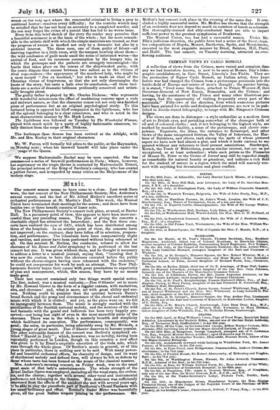alto it -tgbe concert season seems to have come to
a close. Lest week there
were, the -last concert of the New Philharmonic Society, 'Mrs. Anderson's annual concert, and the last of .Mr. Alfred Mellon's excellent series of orchestral performances at St. Martin's Hall. This week, the Musical Union have terminated their meetings forthe season; and there have been besides two or three benefit concerts of lesser note.
The New Philharmonic Society's concert took place, as usual, at ExeterBall. 'In a pecuniary point of view, this appears to liave been moresuc- easeful than any preceding season. The plan of giving the conceits a charitable object‘has attracted the benevolent ; and the first three con- certs have realized the sum of 547L, which has been distributed among three of the hospitals. In an artistic point of view, the concerts have not improved ; on the contrary, they have fallen off in selection, prepare- tion,:and performance. The rehearsals have been comparatively slight and cureless, and pieces have-been performed without being rehearsed at all. -On this account -M. Berlioz, the conductor, refused to allow the choruies of his Romeo-and Juliet symphony to be performed at the last concert but one. It was given without them, and he thought it necessary to address a letter to a musical journal, saying that, "learning that it was now the custom to have the choruses executed before the public without the chorus-singers having -once rehearsed with the orchestra," he could not compromise his work by such an attempt. 'The- New Phil- harmonic Society began their-career with great pretensions to superiority of plan-and management, whieh, this season, they have by no means made good. Their last concert contained only two things worth 'special notice. The first, indeed, was a musical curiosity,—Tam &enter set to music -by Mr. Howard Glover in the form of a molar cantata, with recitatives, airs,-and choruses ! and, whatis more, set with great ability and suc- cessNothing could be quainter than the contrast between Burns's broad Scotch and the pomp and circumstance ofthe choral and orchestral music with which it is clothed ; and yet, as the piece went on, we felt no incongruity between them. The music is strongly marked With-the peculiarities of the Scottish national melody, and the mixture of the wild and fantastic with the genial and ludicrous has been very happily pre- served,—not being lost sight of even in the most unearthly parte -of the choruses. There was in the whole a masterly breadth and simplicity which facilitated its execution. The performance, consequently, was good ; the solos, in particular, being admirably sung by.Mr. Miranda, a young singer of great merit. Tam 0' Shanter deserves to become popullir. The other noticeable feature of the concert was Berlioz's symphony en- titled " Harold in Italy' ; which, however, was no novelty, having been repeatedly performed in London, though on this occasion a new effect was given to it `by Ernst's exquisite 'execution of the'viola solo, which runs through the whole piece. Of Berlioz's music in general, or of this piece in particular, there is nothing new to be said. With many power- ful and beautiful orchestral effects, its obscurity of design, and its want of rhythmical melody and defined form, will always be felt as defects by those whose taste has:been formed on the music of the classical masters.
Mrs. Anderson's morning •concert, on Friday week, was on the usual peat scale of that lady's entertainments. The whole strength of the ,'loyal Italian Opera was-employed, including all the vocal stars, the orches- tra, and the chorus ; together with several other vocal and instrumental performers -not belonging to the theatre. Mrs. Anderson was sufficiently recovered from the effects of the accideht she met with several years ago, to be able to play-the .pianoforte part of Beethoven's Choral Fantasia with her usual' brilliancy and effect. -Rossini's Stabat Hater was beautifully given, all the great Italian -singers 'joining in the performance. -Mr. Mellon's last concert took place in the evening of the same day. It con- cluded a highly successful-series. Mr. Mellon has shown that the strength of an orchestra does-not depend so much on numbers of hands as selection. His thoroughly-trained and ably-conducted band are able to impart sufficient-power to the greatest symphonies of Beethoven.
The Musical Union, too, has had a successful season. Under Mr. Ella's judicious direction, the public have had a series of tbe finest cham- ber compositions of Haydn, Mozart, Beethoven, Spohr, and Mendelssohn, executed -in the most exquisite manner by Ernst, Salmon, Hill, Piaui, and Halle. The last concert, on Tuesday morning, attracted an over- flowing audience.


























 Previous page
Previous page